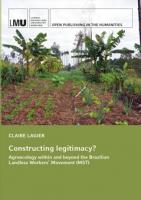Constructing legitimacy? Agroecology within and beyond the Brazilian Landless Workers’ Movement (MST)
Synopsis
How are agroecological transitions and rural development alternatives experienced by farmers and rural activists?
To explore this broad issue, Claire Lagier examines how agroecology’s legitimacy is constructed and contested within the base membership and transnational networks of Brazil’s Landless Workers’ Movement (MST). The MST’s politics of land redistribution— as well as campaigning for sustainable rural livelihoods and education — have attracted significant attention worldwide, as have the food sovereignty alliance La Via Campesina’s agroecological training centres. However, few ethnographic studies have focused on the lived experiences of several generations of activists as they struggle to generate ecological transitions in the food system.
Addressing this gap, Lagier’s study draws on intensive fieldwork carried out in Brazil in 2017–2018 alongside farmers living in a settlement affiliated with the mst , as well as young Latin American food sovereignty activists taking part in agroecological education.
This book is also available in print.
Research data for this publication can be accessed on Open Data LMU:
Downloads

Published
Categories
License
Copyright (c) 2020 Open Publishing in the Humanities

This work is licensed under a Creative Commons Attribution 4.0 International License.

